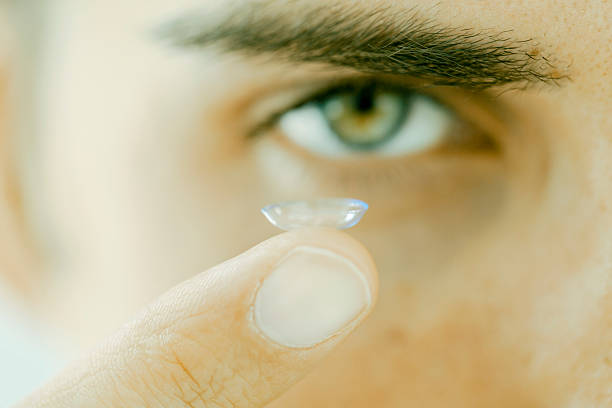Custom-fit scleral lenses improve visual acuity and comfort for patients with corneal distortions. They rest on the sclera, not the cornea, preventing discomfort and creating a new optical surface. The lenses also maintain a liquid environment for optimal healing. Their stability on the eye reduces the risk of accidental dislodgement and enhances comfort, particularly for sensitive or irregularly shaped corneas. Additionally, these lenses are made with breathable material to ensure proper oxygen flow to the eye, promoting overall eye health and comfort.

- Corneo-scleral lenses and semi-scleral lenses are significantly larger than traditional GP lenses and rest near the junction between the cornea and the sclera.
- Mini-scleral lenses vault over the whole corneal surface and rest on the anterior sclera.
- Full scleral lenses are the largest in size and provide the most clearance between the back surface of the lens and the cornea.
The many benefits associated with scleral lenses render them a popular and satisfying choice for patients desiring a clear and comfortable vision.
If you are interested, contact The Eye Center At Jackson to find out if scleral lenses are right for you. Our staff helps patients from all over Jackson and Lakewood, New Jersey, and Rajeev K. Raghu, OD, FAAO, Diplomate, ABO will provide a comprehensive evaluation and the highest level of care.

Scleral Lenses Provide More Comfort and Improved Vision
Our patients report comfort as the most prominent feature of the scleral lens. Throughout the fitting process, we survey our patients on how the lenses feel, and not surprisingly, the usual feedback we get is “fine” or “I can’t feel them at all”.
Traditional contact lenses are much smaller, typically 9 -10 mm in diameter. With each blink, the contact lens moves a bit over the cornea and the lid tends to roll over the edge of the lens as well. Many patients report being unable to wear them for more than a few hours at a time due to the discomfort.
The scleral lens, on the other hand, is larger in diameter and spreads its weight over a much greater, less sensitive area so that when you blink the eyelid doesn’t catch the edge of the lens. Because the lens sits firmly on the eye, it offers more stable vision than traditional lenses. Moreover, having the lens vault over the cornea protects it from any abrasion caused by blinking or external irritants. It is made up of highly oxygen permeable materials and provides a soothing bath of artificial tears that refresh the ocular surface. Scleral lenses not only improve comfort but make for more stable vision.

Anyone seeking to achieve the best vision with contact lenses is a great candidate for scleral lenses. That said, these lenses are particularly useful in managing the following conditions:
- Hard-to-fit Eyes: Those with an irregularly shaped cornea, whether due to natural causes, an eye condition (i.e. keratoconus), or complications following surgery, tend to develop vision problems which cannot be fully corrected using soft contact lenses, as the shape of their eye cause the lenses to easily dislodge. For those people, scleral lenses provide a more comfortable, secure fit and improved vision, which may be even better than glasses.
- Dry Eyes: Those with dry eyes may find traditional contact lenses difficult to wear. Scleral lenses provide a tear reservoir between the back surface of full scleral lenses and the cornea, keeping the front of your eye moist and comfortable.
Any of the following conditions can make wearing traditional contact lenses more challenging:
- Keratoconus
- Astigmatism
- Dry Eyes
- Giant papillary conjunctivitis (GPC)
- Post-refractive surgery (i.e. LASIK, PRK)
- Presbyopia
Young children over 6 months old with ocular surface disease or severe dry eyes can benefit from wearing full scleral lenses to protect their eyes. Mini-scleral lenses, ranging from 15.0mm to 18.0mm, are a good option for children with normal corneas and high refractive errors, as well as those with irregular corneas like keratoconus. They are also suitable for kids who cannot tolerate corneal GP lenses and prefer the comfort of soft contact lenses.
What happens during scleral lens fitting?
We carefully map the patient’s cornea using the latest corneal topography equipment. This generates a detailed diagram of your cornea, which is used to make customized scleral contact lenses.
How difficult is it to insert and care for scleral lenses?
Initially, inserting scleral lenses can be challenging. But after a short period, and thorough training by the optometrist, inserting and removing contact lenses becomes habitual. Scleral lenses are very durable, easy to handle and are easy to care for once the patient is well trained.
What Changes Will I Notice with Scleral Lenses?
Once you have been properly fitted for scleral lenses, you can expect to gradually see improvements in clarity, color and detailed contrast between multiple images and objects within your visual field. The comfort you’ll experience will enable you to wear your custom-made scleral lenses all day long so that you can keep doing all the things you love - but with better vision.
Watch this video to learn how easy and comfortable they are to insert, remove, and wear all day.
When Should I See An Eye Doctor Specializing in Scleral Lenses?
If you are interested in seeing whether scleral lenses are right for you, make sure that the eye doctor you visit has the knowledge and experience required to correctly fit you for the lenses. Scleral lenses require precise customization, and every patient's case varies in degrees of severity and corneal measurements.
Experts in scleral lenses, Rajeev K. Raghu, OD, FAAO, Diplomate, ABO and the attentive staff at The Eye Center At Jackson will ensure that you receive top-notch eye care for all your vision needs.
Does Insurance Cover Scleral Lenses?
When it comes to scleral lenses, every insurance company is different. Some cover the examination and custom fitting, but not the actual lenses. Others may cover a portion of the cost or 100% of the cost, but only if other treatment methods have been exhausted. To understand the coverage and fees you can contact us or check with your specific insurance provider to understand the particulars.




